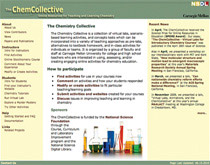David Huang, a junior science major at Carnegie Mellon, wants to refresh his chemistry knowledge. He says his high school AP chemistry course was more about solving math problems than learning by experiment. His chemistry professor, Lenny Vuocolo, gives homework assignments on the ChemCollective Web site, which is designed to move chemistry out of the notebook with simulations of laboratory experiments. Developed by a colleague-David Yaron, an associate professor of chemistry-the free site recently received the Science Prize for Online Resources in Education, sponsored by Science magazine.

Huang digs into the ChemCollective's Virtual Chemistry Laboratory on a problem that asks him to identify the composition and concentration of an unknown acid. He clicks and drags a 250 milliliter flask to his on-screen workbench and pours 50 milliliters of the unknown acid into it. He goes to the virtual stockroom, drags a flask of sodium hydroxide over to the unknown acid, sets the dosage to 1 milliliter, and clicks the pour button. A virtual dose mingles with the unknown acid. He watches for a telltale jump of the pH needle on his screen to identify the acid. Using dozens of tiny clicks like small droplets in a lab titration, the needle budges in tiny increments, but it doesn't jump. He decides the sodium hydroxide solution is too weak and in a few seconds starts over with a stronger one readily pulled from the virtual stockroom. The pH jumps from 5 to 11. He thinks he determines the unknown liquid, but the answer box says the concentration is wrong. With a few more clicks, he redoes the experiment using a larger volume of the unknown acid and smaller increments of sodium hydroxide to reduce the margin of error. His modified experimental design allows him to identify the concentration correctly this time.
For more information, vist: www.chemcollective.org
-Tom Imerito
Related Links:
The ChemCollective--Virtual Labs for Intorductory Chemistry Courses
ChemCollective Receives Science Magazine Award
Carnegie Mellon's ChemCollective Receives Science Prize for Online Resources in Education



